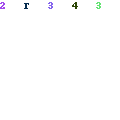No Degree? No Problem!
Many people mistakenly believe that’s impossible to become a programmer without a computer science degree, While a diploma definitely helps, it is not a condition.
In fact, there are very few jobs in the world where the industry resembles anything you learn at school or in university;
most jobs nowadays require hands-on experience within your field, and prior work experience or internships are taken into consideration even more so than course grades.

What Qualifications Do I Need to Be a Programmer?
Technically speaking, if you use a Python shell and write “print(“Hello World”)”, you are now a programmer! In the literal sense, a programmer is someone who can write functional code to “program” a certain application or device into working the way he or she wants it to.
Programming is such a vast domain that it cannot be defined into boundaries. No matter how little or how much you know, there is always a lot more to learn.
You can call yourself a programmer once you are able to write code that achieves the desired purpose e.g. creating a mobile application, solving a cryptography problem, writing efficient code to solve a problem in a programming contest, etc.

The following steps can be considered rough guidelines to start your programming career.
1. Know what you are working for:
- Do you want to create websites?
- Do you want to protect a company from being hacked?
- Do you want to solve challenging problems to train your brain and compete in international competitions?
- Do you want to analyze data and make conclusions?
2. Choose a suitable language for your tracK:
There is a relatively large number of languages available in the world. Why is that? The idea is that the programming field today is so diverse that a single language cannot be powerful enough to achieve all purposes that programming serves.
Upon changes in the requirements of programs, several languages developed.
- Python is good for Artificial Intelligence due to its rich libraries and simplicity.
- Java is good for security as it has both static and dynamic type-checking.
- C++ is good for competitive programming as it gives you immense control of your code’s functions and variables; it is also a great object-oriented programming language.
3. Read a book about the language you intend to master:
It is not enough to Google search every single thing you need. However, the internet has some very detailed references and documentation that could educate you, It is important to know the strengths and weaknesses of the chosen language.
4. PRACTICE!
One could read a hundred books and still be a bad programmer, A major part of programming is writing the actual code, testing it, and debugging it.
Men all over the world have ripped their hair off while trying to figure out why their code is not working. But hey, do not be discouraged just yet! 😊
How Long Does It Take to Become a Programmer?
That depends immensely on the type of programming you are learning. It takes around one month to become comfortable with a language, but the language is only the shell that covers the true program: its functionality.
Mastering topics such as data structures and algorithms or object-oriented programming with all its characteristics (multiple inheritances, polymorphism, etc.) can take years! However, practice is your highway to success.
Do I Need a Computer Science Degree to Become a Programmer?
Not really! While some Computer Science courses are very helpful in programming, today, everything can be found on the internet.
Important topics that we learn in college include space and time complexity analysis, discrete mathematics and statistics, data structures and algorithms, design of analysis and algorithms, and some programming or markup languages such as C++, Python, Java, Scala, …

Nonetheless, while the added value of university-level education is that it teaches you exactly what you need for each purpose and helps you choose what you need accurately, the implementation can be learned individually.
Some helpful books include “The C Programming Language” by Brian Kernighan, “Effective Java” by Joshua Bloch, and “Think Python: An Introduction to Software Design” by Allen B. Downey.
Can I Get a Job as a Programmer Without a Degree?
Surprisingly and fortunately, the answer is yes! While a degree is definitely a good plus, software development and engineering companies usually look for skill as a primary requirement.

If an individual has mastered a certain topic and wants to work with it, chances are they will be accepted into a good company with a good position.
How Do I Get a Job as a Programmer Without a Degree?
Again, the most important thing here is knowing precisely what you want to work for.
Several online platforms, such as Coursera, Udemy, and MIT Open Course are available to everyone with an internet connection. They contain endless courses about endless topics.
If you want to work in Cybersecurity, for example, the courses you will be looking for should include Cryptography, Ethical Hacking, and Internet Security.
Keep in mind that the goal is to learn and retain the information, not finish the course quickly and add it to your resume!

Companies look for confidence. They do not look for people who do not make mistakes; they look for people who make mistakes then fix them and carry on.
To acquire this level of confidence, you should practice, learn common coding practices by reading other people’s code, use the same tools that are used in the industry to get the hang of it, and work on projects from start to finish.
It is easy to start a project – finishing the project and solving all the issues you encounter is the difficult part.
Another important thing to do when you want companies to notice you is to work on your resume and profile. Let’s face it, without a degree, you will not be a company’s first choice. Therefore, you need other things to make up for it.
These things include relative work experience, a strong profile, good certificates and awards, internships and personal projects, and so on. The important thing is to stay active.
Which Companies Hire Programmers Without a Degree?
Some of the top companies in the world hire people without a degree, even companies in Big Tech. Google, Apple, Facebook, IBM, LinkedIn, Pinterest, Airbnb, and eBay are all examples of such companies.
Note that you do not have to be working for a company at all! Certain platforms like Upwork display a lot of demand for programming. You can find all sorts of jobs there, and they increase by the day.
These jobs can fluctuate from a 2-hour task for an individual to a long-term contract with a company.
How Much Money Does a Programmer Without a Degree Earn?
Normally, respectful companies do not discriminate between programmers with a degree and programmers without a degree.
However, if the job is entry-level, companies will pay about $35,000 – $40,000 per year. This rate can double if the employee is promoted.
An employee is an employee and thus has the right to earn just as much as his or her colleagues do, given that the job and the quality of work delivered are the same.

All in all, if you work hard enough for the job you desire, you can definitely get it. The most important thing is to set a goal and follow the right steps towards achieving it, and always keep learning and stay up to date with the industry.



